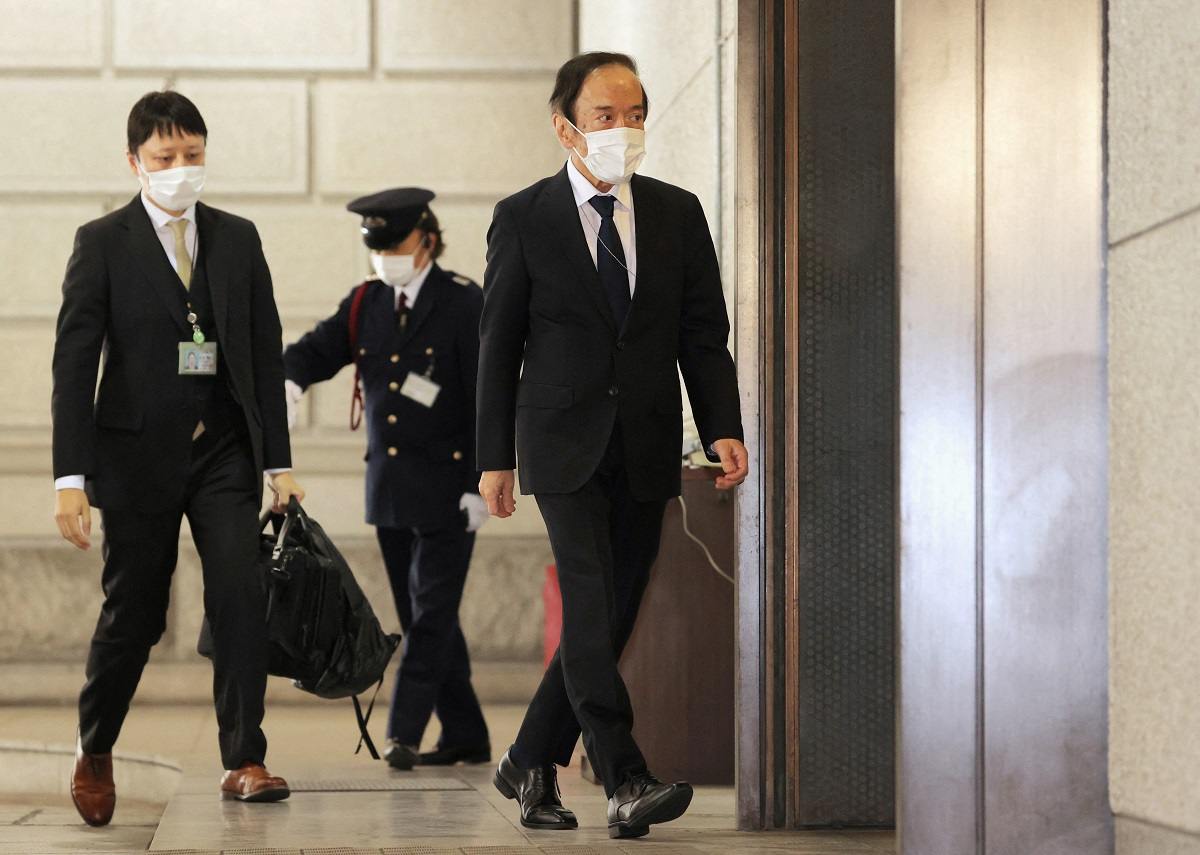
New Bank of Japan Governor Kazuo Ueda arrives at the bank headquarters on his first day at work in Tokyo, Japan April 10, 2023.
13:08 JST, April 10, 2023
TOKYO (Reuters) – Japan’s new central bank governor Kazuo Ueda faces a bumpy road as slowing global growth clouds prospects for a sustained pickup in inflation and wages, a prerequisite for phasing out his predecessor’s controversial monetary stimulus.
The 71-year-old academic’s term began on Sunday, succeeding Haruhiko Kuroda, whose second, five-year term ended on Saturday. Ueda and his two deputy governors, Shinichi Uchida and Ryozo Himino, will hold a joint news conference at 1015 GMT on Monday.
Markets will be looking for clues on how soon Ueda could phase out an unpopular bond yield control policy that has drawn criticism for distorting markets and hurting bank margins.
In parliamentary confirmation hearings in February, Ueda has stressed the need to keep ultra-easy policy to ensure Japan sustainably achieves the BOJ’s 2% inflation target backed by wage growth.
But with inflation exceeding the target, many analysts expect the BOJ to tweak or end yield curve control (YCC), a policy combining a 0.1% target for short-term interest rate and a 0% cap for the 10-year bond yield, as soon as this quarter.
“The increasing side-effects are a sign the policy effect (of YCC) is working its way through the economy,” former BOJ deputy governor Hiroshi Nakaso was quoted as saying in an interview with the Nikkei newspaper.
“When the appropriate timing comes, the BOJ’s new leadership will likely modify or abolish YCC,” he said.
Japan’s long-stagnant inflation and wage growth are showing budding signs of change. After hitting a 41-year high of 4.2% in January, core consumer inflation remains above 3% as more firms hike prices in response to rising raw material costs.
To compensate households for the increase in living costs, major firms have offered wage hikes of nearly 4% this year in annual labor talks, the fastest pace in about three decades.
At his final briefing as governor on Friday, Kuroda said Japan was moving closer to achieving sustained 2% inflation as the public’s long-held perception that prices won’t rise, was beginning to change.
But mounting U.S. recession fears are among headwinds for Japan’s export-reliant economy. While the end to COVID-19 curbs is propping up consumption, some analysts warn a recent slew of price hikes for daily necessities could also hurt spending.
Ueda will chair his first policy meeting on April 27-28, when the board produces fresh quarterly growth and price forecasts extending through fiscal 2025.
Markets are focusing on whether the board will project inflation accelerating towards, or even hitting, 2% inflation in fiscal 2024 and 2025.
Under current forecasts, the BOJ expects core consumer inflation to hit 1.6% in the current fiscal year that began in April and accelerate to 1.8% the following year.
Ueda served as BOJ board member from 1998 to 2005, during which the central bank introduced zero interest rates and then quantitative easing to combat deflation and economic stagnation.
Top Articles in News Services
-

Survey Shows False Election Info Perceived as True
-

Hong Kong Ex-Publisher Jimmy Lai’s Sentence Raises International Outcry as China Defends It
-

Japan’s Nikkei Stock Average Touches 58,000 as Yen, Jgbs Rally on Election Fallout (UPDATE 1)
-

Japan’s Nikkei Stock Average Falls as US-Iran Tensions Unsettle Investors (UPDATE 1)
-

Trump Names Former Federal Reserve Governor Warsh as the Next Fed Chair, Replacing Powell
JN ACCESS RANKING
-

Producer Behind Pop Group XG Arrested for Cocaine Possession
-

Japan PM Takaichi’s Cabinet Resigns en Masse
-

Man Infected with Measles Reportedly Dined at Restaurant in Tokyo Station
-

Israeli Ambassador to Japan Speaks about Japan’s Role in the Reconstruction of Gaza
-

Videos Plagiarized, Reposted with False Subtitles Claiming ‘Ryukyu Belongs to China’; Anti-China False Information Also Posted in Japan
























